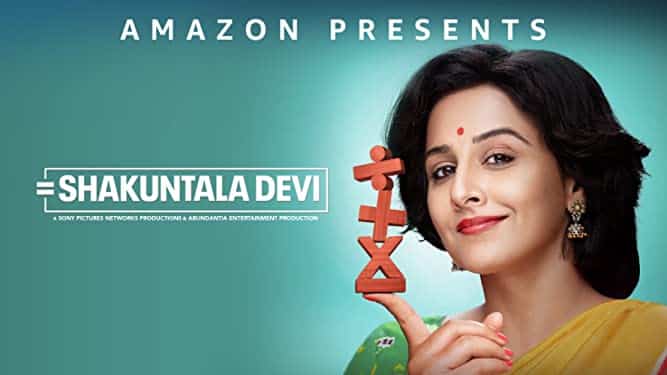
The thing about biopics is that they may be narratives not very flattering to the personalities of those lives being dramatized.
A biopic is always different than a movie for entertainment. or a conduit for escapism. In biopics, you portray historic people with all their tragedy, drama, failures, shortcomings and tears. You step into the shoes of the people whose lives are being narrated and live in those shoes as the complex, difficult people most of us are.
This biopic of a woman who lived life at her own terms is narrated by her daughter. The perspectives are those of her daughter based on her experiences of growing up with her mother.
We explore the inner world of Shakuntala Devi’s life from the perspective of her daughter. Though the story is powerful in its messaging, yet it is quite patchy in its narrative. We are not sure if that narrative is patchy to compensate for the fact that the story is told from the point of view of the daughter or if it is edited for momentum of script.
The story of a woman who being born in the late 1920’s in Bangalore, India into a poor family who realize that their daughter is a math prodigy. ( the movie calls it Maths- that is what British English calls it in most British colonies around the world except the North American ones). The journey of a non- conformist who is confident, focussed and brilliant Shakuntala from a village in South India to the Royal Mathematics Society in England,where she impresses the members with her ability to compute quicker than the computers they had, is quite remarkable.
Her personality is singularly focused on the love of her life – math. Till she falls in love with her daughter, and math takes a back seat. She realises very quickly that she is not the person who will be happy and fulfilled away from doing things that make her who the person she is, so with the help of a very broadminded and supportive husband, she makes her way back into The relationship between her and her art of math computing is very intricate; it makes her an invigorated person and Vidya Balan portrays it very well at all stages of Shakuntala’s life. Her contempt for her own mother, who she thought as weak, and the propensity to control the life of her daughter, who she thought was an extension of her own self is a very complicated emotion to portray but Balan is able to pull it off with sophistication and aplomb.
Casting of Sanya Malhotra in the role of Shakuntala’s daughter is appropriate though there was not enough crackle between Balan’s finesse as an actor when Sanya seemed to be struggling. Amit Sadh, was understated, tacit and craftful in a very limited role, yet very effective,
On the whole, a great watch for the weekend, albeit, a bit patchy on the narrative especially with the little unexplained jumps. Music is very average and kind of spoils the human reality of a brilliant woman’s life who not only was brave enough to chart her way through choices which women have never made before while being unapologetic about the discretions she made.
She clearly understood that being a wife or a mother are roles that do not diminish the person she was in her core. She could not do justice to herself by setting aside her own aspirations for the sake of roles that evolved her as a person.
She is flawed, makes mistakes, learns, leaps, falls – yet it never enters her mind that she may be being judged by those around her. She was impervious to what others said and felt about her. She found it difficult to understand why men and women had to make different choices. She was restless and progressive, picked up new skills, reinvented and revitalized herself, and saw the whole world through the lens of her math equations.




